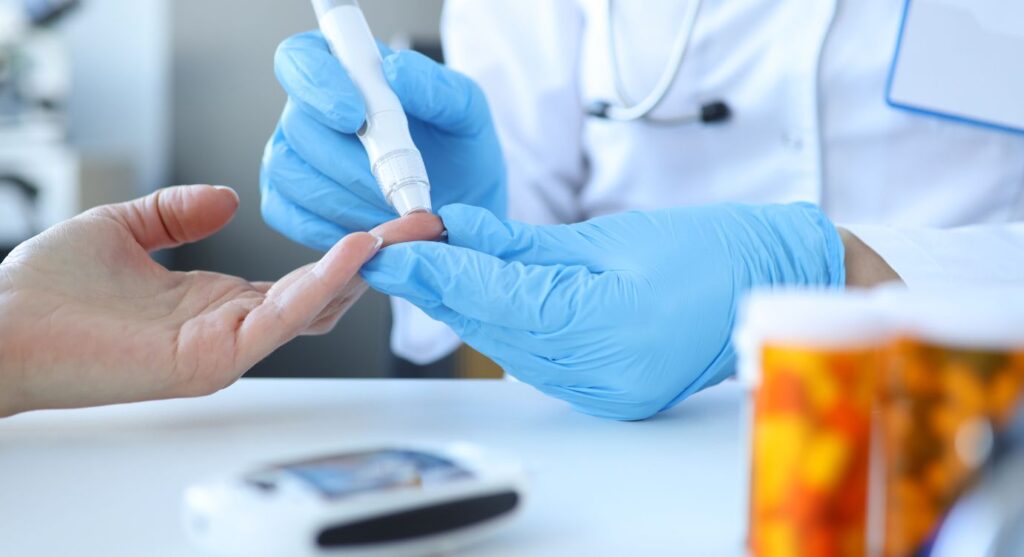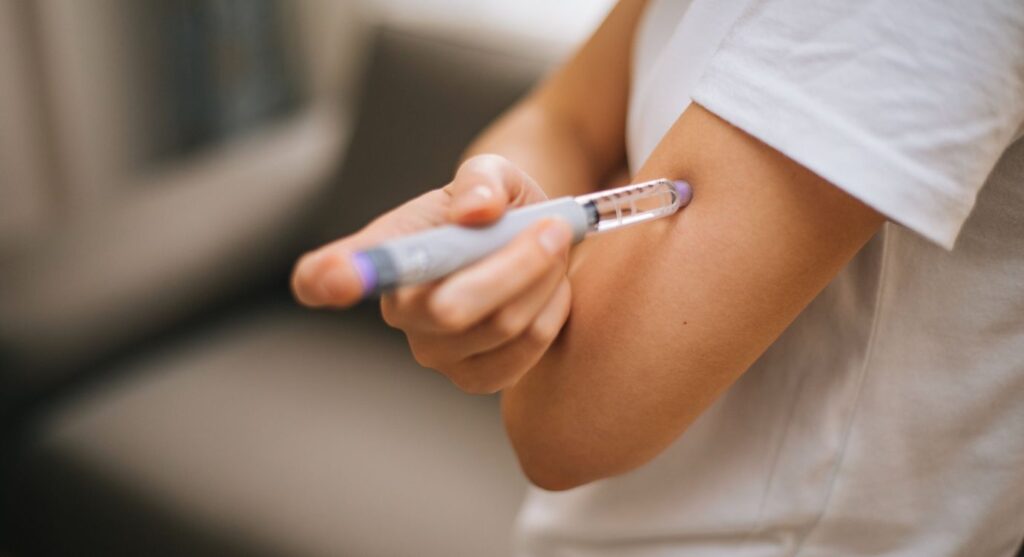Free delivery on all orders over £45
Free delivery on all orders over £45

Medically reviewed by
When considering the benefits of CBD oil for diabetes, the first thing to remember is that CBD is not a recognised treatment for this (or any other) condition.
Anyone trying to sell CBD as a cure or medicine for diabetes should be avoided at all costs. Dramatic, we know – but there are a lot of fake and harmful claims being made that simply can’t be backed by science.
With this important caveat out of the way, let’s take a balanced look at how individuals living with diabetes can include CBD oil as part of a healthy and active lifestyle.
Rather than being a medicine, CBD is best viewed as a health supplement – a natural tool to support the endocannabinoid system and boost overall health and wellness.
In this article, we will cover:
… And much more! Let’s get stuck in.
CBD stands for cannabidiol. It is a compound extracted from the hemp plant capable of mimicking endocannabinoids produced in the body.
There’s still a lot we don’t know about the endocannabinoid system, but we do know that taking a CBD supplement can be beneficial. The ECS is responsible for maintaining a state of homeostasis in different parts of the body.
It is thought to be involved in various functions, including sleep, mood, memory, appetite, reproduction and pain response.
10% off on your first order
Complete this one-minute quiz and find the right products for you.
Diabetes is a chronic condition that affects how the body processes food and turns it into fuel. Diabetes requires lifelong treatment and lifestyle changes to help manage the symptoms.
Under normal circumstances, when a person eats food, it is broken down into glucose and then enters the bloodstream. From here, it can be put to work in cells throughout the body.
As blood sugar levels increase, the body releases a hormone called insulin. This acts as a gatekeeper that allows glucose into cells.
When an individual has diabetes, they either don’t produce insulin, or the insulin isn’t as adequate as it should be. This means that individuals will struggle to control the amount of glucose in their blood.
There are two main types of diabetes.
Symptoms of diabetes can include:
Diabetes is managed through the use of insulin injections and lifestyle changes. While type 1 diabetes cannot be prevented, there are steps you can take to control and even reverse type 2 diabetes.

“Will CBD cure my diabetes?”
The short answer is no.
As of yet, there haven’t been any clinical trials to test CBD’s potential in the prevention of either type 1 or type 2 diabetes.
However, there is promising preliminary research which suggests that using CBD oil for diabetes might help to lower blood sugar levels.
One study of interest, conducted ten years ago, found that the CBD 1 endocannabinoid system regulates adipocyte (fat cells) insulin sensitivity, which helps to maintain glucose levels in the body.
The study claims, “Mounting evidence suggests that the endocannabinoid system regulates energy metabolism, through direct effects on peripheral tissues as well as central effects that regulate appetite.”
CBD could also help with the nerve pain associated with diabetes. One 2017 animal study suggested that CBD effectively reduces diabetes-related nerve pain, such as neuropathy, which can cause numbness, tingling, and muscle weakness.
As such, there have been murmurs that CBD could be a great tool in helping people with neuropathy and other nerve pain reduce reliance on strong prescription painkillers.
CBD oil is not addictive or associated with substance abuse and dependency. Our favourite cannabinoid is generally well-tolerated and has a good safety profile.
Does this mean that all CBD is completely safe? Is CBD oil definitely safe for diabetics? Unfortunately, not always.
When taking CBD oil for diabetes, the most significant concern is whether or not it may not interact with other prescription medications.
Read more: Will CBD interact with medication?
If this is the case, you might not be able to take CBD supplements. Always check with a medical professional before integrating CBD into your wellness routine.
Another critical consideration is the quality of the CBD oil you purchase.
Unfortunately, some sellers are less reputable than others. As a result, there is always the risk of buying CBD oil contaminated with heavy metals, pesticides or illegal levels of THC.
Make sure to buy your CBD from reputable outlets or manufacturers, and stick with brands you trust.

Individuals with diabetes can take CBD in many forms, including sublingual CBD oil drops, CBD capsule supplements and topical CBD balms.
When taking CBD for diabetes, we’d advise you to avoid consuming your CBD in gummy sweets, as these will typically contain high sugar levels.
It’s also important to check the certificate of analysis to confirm that your CBD oil contains legal levels of THC.
Read more: CBD oil vs capsules
So how much CBD oil should I take? Should I take less or more CBD because I have diabetes?
The best CBD dosage for diabetes will depend on your general tolerance and the level of endocannabinoids your body is already making.
It will also depend on your motivations for taking CBD. If you’re doing so to help reduce pain and inflammation, the correct dosage for you will likely differ from the required dosage for someone consuming CBD for other reasons.
As always, we recommend starting low and slow and increasing CBD intake gradually until you’ve found a level that works for you.
Of course, this doesn’t mean you should glug a bottle of CBD oil a day (!) – never exceed the FSA’s maximum daily intake guidelines – currently set at 70mg per day.
Read more: How to take CBD oil
Is there a specific type of CBD which will work best for diabetes? Which type of CBD should I pick?
While there is, unfortunately, no data to indicate precisely which type of CBD may work best for diabetics – we can still help to impart some information with this one.
Generally, a consumer will face three types of CBD to choose from: full-spectrum CBD oil (FSO), broad-spectrum CBD oil, and CBD isolate.
At Evopure, all of our CBD is broad spectrum. Not to toot our own horn, but we think broad-spectrum oil is a great place to start.
Like FSO, broad-spectrum CBD allows you to benefit from the entourage effect (a theory which suggests results are boosted when different cannabinoids interact with one another); while knowing that your CBD is THC-free.
If you’re happy to consume up to 0.2mg of THC, FSO can be an excellent choice.
If you are likely to be drug tested at work, CBD isolate may be the best option. With reputable companies, you can be sure isolates will not trigger a false THC positive.
Read more: CBD and drug tests
CBD cannot cure diabetes, and more research is (as always) needed to establish the efficacy and potential of CBD oil as a tool to help with symptom management.
However, research into using CBD’s potential to help alleviate several diabetes symptoms is promising – particularly where nerve pain, inflammation and insomnia are concerned.
If you’re looking to start using CBD oil for diabetes – and have the all-clear from a medical professional to do so – always start low and slow, and don’t be afraid to spend some time determining which methods and type of CBD will be best for you.
Sign up for the Evopure newsletter:
This product is not for use by or sale to persons under the age of 18. It should not be used if you are pregnant or nursing. Consult with a physician before use if you have a serious medical condition or use prescription medications. A Doctor’s advice should be sought before using this and any supplemental dietary product. This product is not intended to diagnose, treat, cure or prevent any disease.
© Evopure Ltd. All rights reserved Terms & Conditions Cookie Policy Sitemap